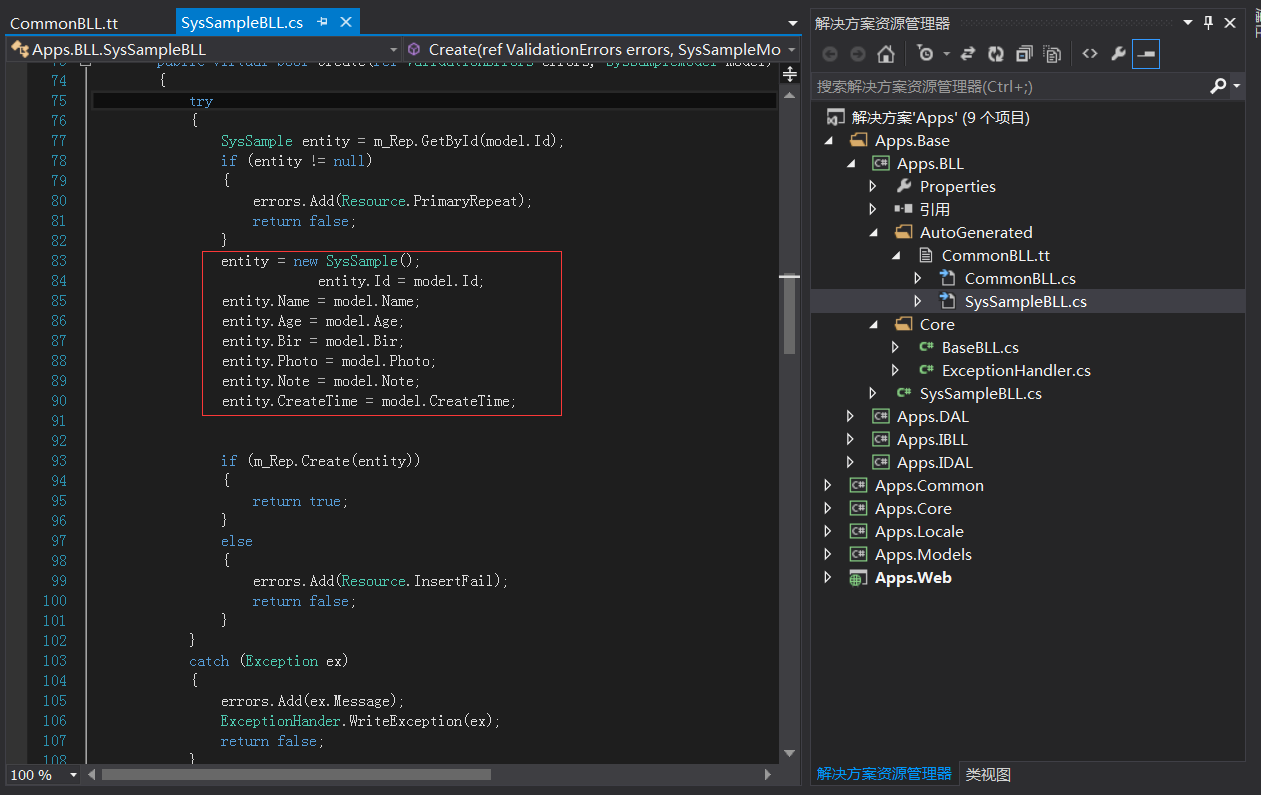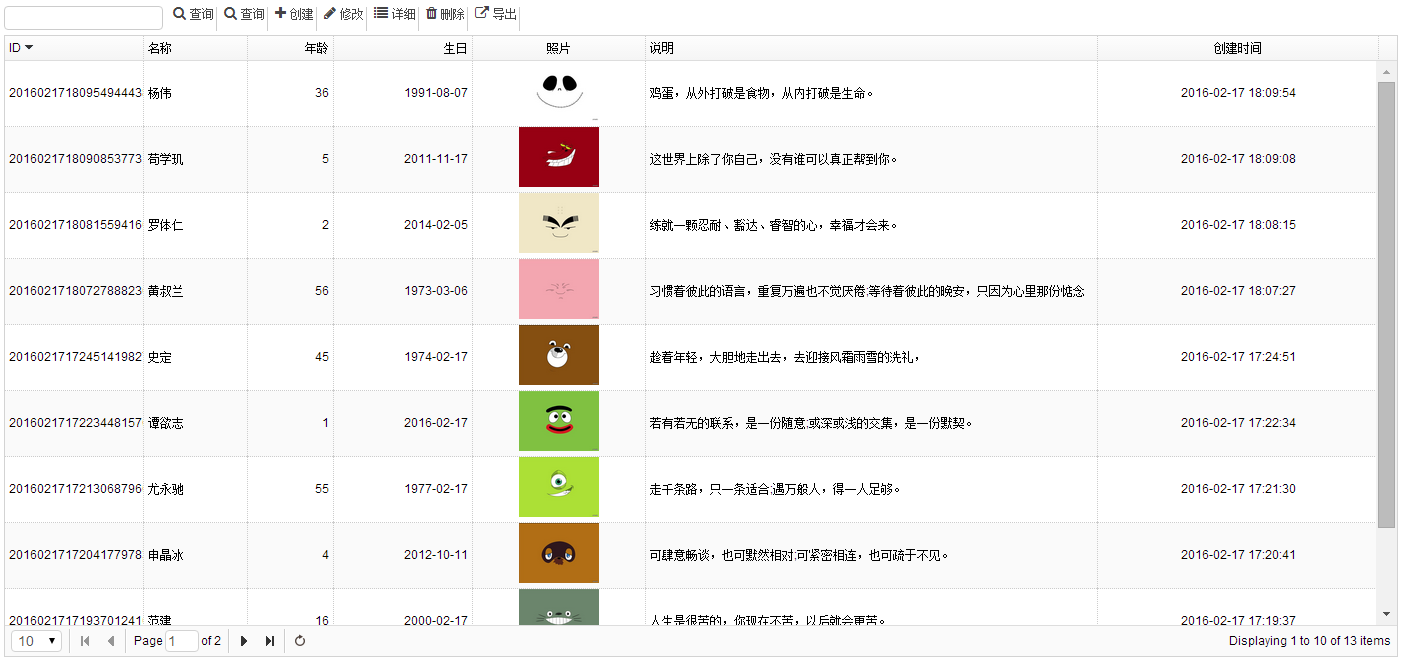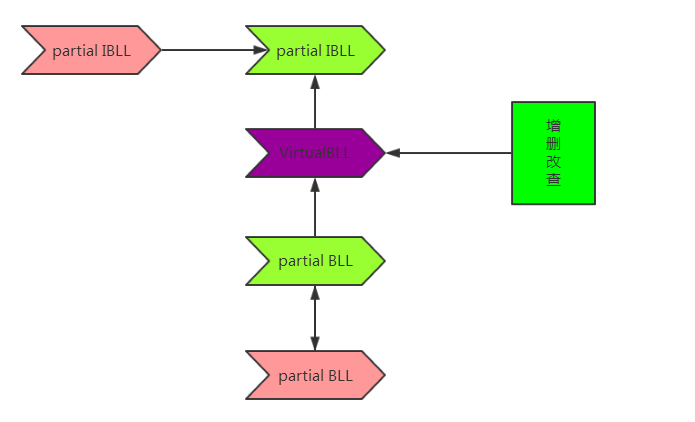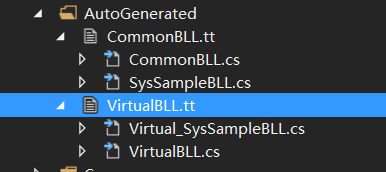ASP.NET MVC5+EF6+EasyUI 后台管理系统(59)-BLL层重构
系列目录
前言:
这应该是本系统最后一次重构,将重构BLL层和Model层。来完全取代代码生成器生成的BLL层和DAL层。完全废掉了代码生成器的DAL,BLL,MODEL层。
全自动生成增,删,改,查的通用方法和模型转换与BLL层的模型事务脱离,后续文章,会以一些插件或功能为目的,继续完善,进行分享,最后60节的文章会对本系统做一个总结
(但是还没时间写,相信60节的文章能让你快速了解到本系统的优势和架构,就算你从未阅读之前的所有文章)
继上次的DAL层重构(上一节),本来只想重构DAL层算了,但是鉴于本人是代码强迫症患者,所以花了些时间把BLL层重构。
在此务必共鸣一个问题,代码重构不是架构改变,这个系统的架构完全还是原来的接口多层注入架构!如下图所示完全不变

最后必须让初学者理解一个知识点:分部类 partial 关键字,因为我们的重构是围绕分部类而实现,包括接口
partial 关键字指示可在命名空间中定义该类、结构或接口的其他部分。所有部分都必须使用 partial 关键字。在编译时,各个部分都必须可用来形成最终的类型。各个部分必须具有相同的可访问性,如 public、private 等。
如果将任意部分声明为抽象的,则整个类型都被视为抽象的。如果将任意部分声明为密封的,则整个类型都被视为密封的。如果任意部分声明基类型,则整个类型都将继承该类。
指定基类的所有部分必须一致,但忽略基类的部分仍继承该基类型。各个部分可以指定不同的基接口,最终类型将实现所有分部声明所列出的全部接口。在某一分部定义中声明的任何类、结构或接口成员可供所有其他部分使用。最终类型是所有部分在编译时的组合。
下列声明:
partial class Earth : Planet, IRotate { }
partial class Earth : IRevolve { }
等效于下列声明:
class Earth : Planet, IRotate, IRevolve { }
1.改变现状
相比我们DAL层,重构BLL层是有技术难度的,因为业务层涉及模型的转换构成,虽然只重构模块的(增、删、改、查),下面我们开始
下载上一节代码(https://yunpan.cn/cYUdjssbmiLrL 访问密码 e622)来分析业务层。
分析:IBLL,BLL
IBLL层不用说了,跟IDAL层是一致的
所以我们直接复制IDAL的TT模版修改后如下
<#@ template language="C#" debug="false" hostspecific="true"#>
<#@ include file="../../Apps.Models/Common.ttinclude"#><#@
output extension=".cs"#>
<# const string inputFile = @"../../Apps.Models/DB.edmx";
var textTransform = DynamicTextTransformation.Create(this);
var code = new CodeGenerationTools(this);
var ef = new MetadataTools(this);
var typeMapper = new TypeMapper(code, ef, textTransform.Errors);
var fileManager = EntityFrameworkTemplateFileManager.Create(this);
var itemCollection = new EdmMetadataLoader(textTransform.Host, textTransform.Errors).CreateEdmItemCollection(inputFile);
var codeStringGenerator = new CodeStringGenerator(code, typeMapper, ef); if (!typeMapper.VerifyCaseInsensitiveTypeUniqueness(typeMapper.GetAllGlobalItems(itemCollection), inputFile))
{
return string.Empty;
} WriteHeader(codeStringGenerator, fileManager); foreach (var entity in typeMapper.GetItemsToGenerate<EntityType>(itemCollection))
{
fileManager.StartNewFile("I"+entity.Name + "BLL.cs");
#>
using System;
using Apps.Common;
using System.Collections.Generic;
using Apps.Models<#=entity.Name.IndexOf("_")>?"."+entity.Name.Substring(,entity.Name.IndexOf("_")):".Sys" #>;
namespace Apps.IBLL
{
public partial interface I<#=entity.Name #>BLL
{
List<<#=entity.Name #>Model> GetList(ref GridPager pager, string queryStr);
bool Create(ref ValidationErrors errors, <#=entity.Name #>Model model);
bool Delete(ref ValidationErrors errors, string id);
bool Delete(ref ValidationErrors errors, string[] deleteCollection);
bool Edit(ref ValidationErrors errors, <#=entity.Name #>Model model);
<#=entity.Name #>Model GetById(string id);
bool IsExists(string id);
}
<#
EndNamespace(code); } fileManager.Process(); #>
ICommonBLL.tt

非常好。业务层完成跟预期是一样的!这样我们直接可以看到我们原来的ISysSample可以由
using System.Collections.Generic;
using Apps.Common;
using Apps.Models.Sys;
namespace Apps.IBLL
{ public interface ISysSampleBLL
{
List<SysSampleModel> GetList(ref GridPager pager, string queryStr);
bool Create(ref ValidationErrors errors, SysSampleModel model);
bool Delete(ref ValidationErrors errors, string id);
bool Delete(ref ValidationErrors errors, string[] deleteCollection);
bool Edit(ref ValidationErrors errors, SysSampleModel model);
SysSampleModel GetById(string id);
bool IsExist(string id);
}
}
变为--->
using System.Collections.Generic;
using Apps.Common;
using Apps.Models.Sys;
namespace Apps.IBLL
{
public partial interface ISysSampleBLL
{ }
}
代码行数发生质的改变,可以我们就可以扩展自己的接口方法,利用partial类
照样画葫芦,业务层也生成
直接上TT代码
<#@ template language="C#" debug="false" hostspecific="true"#>
<#@ include file="../../Apps.Models/Common.ttinclude"#><#@
output extension=".cs"#>
<#
const string usingName = "";
const string inputFile = @"../../Apps.Models/DB.edmx";
var textTransform = DynamicTextTransformation.Create(this);
var code = new CodeGenerationTools(this);
var ef = new MetadataTools(this);
var typeMapper = new TypeMapper(code, ef, textTransform.Errors);
var fileManager = EntityFrameworkTemplateFileManager.Create(this);
var itemCollection = new EdmMetadataLoader(textTransform.Host, textTransform.Errors).CreateEdmItemCollection(inputFile);
var codeStringGenerator = new CodeStringGenerator(code, typeMapper, ef); if (!typeMapper.VerifyCaseInsensitiveTypeUniqueness(typeMapper.GetAllGlobalItems(itemCollection), inputFile))
{
return string.Empty;
} WriteHeader(codeStringGenerator, fileManager); foreach (var entity in typeMapper.GetItemsToGenerate<EntityType>(itemCollection))
{
if(entity.Name.StartsWith("Sys") || entity.Name.StartsWith("JOB"))
{
fileManager.StartNewFile(""+entity.Name + "BLL.cs");
var simpleProperties = typeMapper.GetSimpleProperties(entity);
#>
using System;
using System.Collections.Generic;
using System.Linq;
using Apps.Models;
using Apps.Common;
using Microsoft.Practices.Unity;
using System.Transactions;
using Apps.IBLL;
using Apps.IDAL;
using Apps.BLL.Core;
using Apps.Locale;
using Apps.Models<#=entity.Name.IndexOf("_")>?"."+entity.Name.Substring(,entity.Name.IndexOf("_")):".Sys" #>;
namespace Apps.BLL
{
public partial class <#=entity.Name #>BLL:I<#=entity.Name #>BLL
{
[Dependency]
public I<#=entity.Name #>Repository m_Rep { get; set; } public virtual List<<#=entity.Name #>Model> GetList(ref GridPager pager, string queryStr)
{ IQueryable<<#=entity.Name #>> queryData = null;
if (!string.IsNullOrWhiteSpace(queryStr))
{
queryData = m_Rep.GetList(
<#
int i =;
if (simpleProperties.Any()){foreach(var edmProperty in simpleProperties){
if(i==)
{ #>
<#=codeStringGenerator.Property(edmProperty).ToString().IndexOf("string")>?"a=>a."+edmProperty+".Contains(queryStr)":""#>
<#
if(codeStringGenerator.Property(edmProperty).ToString().IndexOf("string")>)
{
i=;
}
}
else if(i==)
{#>
<#=codeStringGenerator.Property(edmProperty).ToString().IndexOf("string")>?"|| a."+edmProperty+".Contains(queryStr)":""#>
<#
} #>
<#} }#>
);
}
else
{
queryData = m_Rep.GetList();
}
pager.totalRows = queryData.Count();
//排序
queryData = LinqHelper.SortingAndPaging(queryData, pager.sort, pager.order, pager.page, pager.rows);
return CreateModelList(ref queryData);
}
public virtual List<<#=entity.Name #>Model> CreateModelList(ref IQueryable<<#=entity.Name #>> queryData)
{ List<<#=entity.Name #>Model> modelList = (from r in queryData
select new <#=entity.Name #>Model
{
<#
if (simpleProperties.Any())
{
foreach(var edmProperty in simpleProperties)
{
#>
<#=edmProperty#> = r.<#=edmProperty#>,
<#
}
}
#>
}).ToList(); return modelList;
} public virtual bool Create(ref ValidationErrors errors, <#=entity.Name #>Model model)
{
try
{
<#=entity.Name #> entity = m_Rep.GetById(model.Id);
if (entity != null)
{
errors.Add(Resource.PrimaryRepeat);
return false;
}
entity = new <#=entity.Name #>();
<# if (simpleProperties.Any())
{
foreach(var edmProperty in simpleProperties)
{
#>
entity.<#=edmProperty#> = model.<#=edmProperty#>;
<#
}
}
#> if (m_Rep.Create(entity))
{
return true;
}
else
{
errors.Add(Resource.InsertFail);
return false;
}
}
catch (Exception ex)
{
errors.Add(ex.Message);
ExceptionHander.WriteException(ex);
return false;
}
} public virtual bool Delete(ref ValidationErrors errors, string id)
{
try
{
if (m_Rep.Delete(id) == )
{
return true;
}
else
{
return false;
}
}
catch (Exception ex)
{
errors.Add(ex.Message);
ExceptionHander.WriteException(ex);
return false;
}
} public virtual bool Delete(ref ValidationErrors errors, string[] deleteCollection)
{
try
{
if (deleteCollection != null)
{
using (TransactionScope transactionScope = new TransactionScope())
{
if (m_Rep.Delete(deleteCollection) == deleteCollection.Length)
{
transactionScope.Complete();
return true;
}
else
{
Transaction.Current.Rollback();
return false;
}
}
}
return false;
}
catch (Exception ex)
{
errors.Add(ex.Message);
ExceptionHander.WriteException(ex);
return false;
}
} public virtual bool Edit(ref ValidationErrors errors, <#=entity.Name #>Model model)
{
try
{
<#=entity.Name #> entity = m_Rep.GetById(model.Id);
if (entity == null)
{
errors.Add(Resource.Disable);
return false;
}
<#
if (simpleProperties.Any())
{
foreach(var edmProperty in simpleProperties)
{
#>
entity.<#=edmProperty#> = model.<#=edmProperty#>;
<#
}
}
#> if (m_Rep.Edit(entity))
{
return true;
}
else
{
errors.Add("没有数据改变");
return false;
} }
catch (Exception ex)
{
errors.Add(ex.Message);
ExceptionHander.WriteException(ex);
return false;
}
} public virtual <#=entity.Name #>Model GetById(string id)
{
if (IsExists(id))
{
<#=entity.Name #> entity = m_Rep.GetById(id);
<#=entity.Name #>Model model = new <#=entity.Name #>Model();
<#
if (simpleProperties.Any())
{
foreach(var edmProperty in simpleProperties)
{
#>
model.<#=edmProperty#> = entity.<#=edmProperty#>;
<#
}
}
#>
return model;
}
else
{
return null;
}
} public virtual bool IsExists(string id)
{
return m_Rep.IsExist(id);
}
public void Dispose()
{ } }
<#
EndNamespace(code);
}
} fileManager.Process(); #>
CommonBLL.tt

由于每一个业务模型的属性都不一致,这里不能用List<T>来做,所以,一个表会生成一个BLL类。(图中红色部分)
如果生成红色部分。主要看下面代码
<#
if (simpleProperties.Any())
{
foreach(var edmProperty in simpleProperties)
{
#>
<#=edmProperty#> = r.<#=edmProperty#>,
<#
}
}
#>
获取表模型的所有属性,所有这段对很多人是有帮助的,请收藏,说不定你以后要用到
OK,编译通过,运行正确,还是熟悉的面孔

但是至此。我们的业务层和数据访问层,可以说是一行代码都没写。足够体现了TT模版的强大之处,相比我们之前要用代码生成器来得极其方便
2.引发问题
直到上面步骤,一切都很顺利,没有一点不妥。
有经验的园友会发现,里面东西都是写死的。而且分部类不可以重写自己。
比如说。我在处理 entity.Name = model.Name;时候我想entity.Name = model.Name.TrimStart() 去掉字符串前面的空格,那么可以看到根本无法操作。
然而我们需要重写,但是又发现无法重写分部类的方法,怎么做?必须用一张图来看,我是这么做的

- 绿色是我们已经重构完成的。
- 紫色是我们需要重构的一个TT模版,这是所有都是虚方法的类
- 粉色是我们自己扩张的业务方法,目前为空
虚方法是可以重写的关键字是virtual 以下重写之后优先级高于前者 用override。用代码来说明
改变一下CommonBLL.tt
<#@ template language="C#" debug="false" hostspecific="true"#>
<#@ include file="../../Apps.Models/Common.ttinclude"#><#@
output extension=".cs"#>
<#
const string usingName = "";
const string inputFile = @"../../Apps.Models/DB.edmx";
var textTransform = DynamicTextTransformation.Create(this);
var code = new CodeGenerationTools(this);
var ef = new MetadataTools(this);
var typeMapper = new TypeMapper(code, ef, textTransform.Errors);
var fileManager = EntityFrameworkTemplateFileManager.Create(this);
var itemCollection = new EdmMetadataLoader(textTransform.Host, textTransform.Errors).CreateEdmItemCollection(inputFile);
var codeStringGenerator = new CodeStringGenerator(code, typeMapper, ef); if (!typeMapper.VerifyCaseInsensitiveTypeUniqueness(typeMapper.GetAllGlobalItems(itemCollection), inputFile))
{
return string.Empty;
} WriteHeader(codeStringGenerator, fileManager); foreach (var entity in typeMapper.GetItemsToGenerate<EntityType>(itemCollection))
{
if(entity.Name.StartsWith("Sys") || entity.Name.StartsWith("JOB"))
{
fileManager.StartNewFile("Virtual_"+entity.Name + "BLL.cs");
var simpleProperties = typeMapper.GetSimpleProperties(entity);
#>
using System;
using System.Collections.Generic;
using System.Linq;
using Apps.Models;
using Apps.Common;
using Microsoft.Practices.Unity;
using System.Transactions;
using Apps.IBLL;
using Apps.IDAL;
using Apps.BLL.Core;
using Apps.Locale;
using Apps.Models<#=entity.Name.IndexOf("_")>?"."+entity.Name.Substring(,entity.Name.IndexOf("_")):".Sys" #>;
namespace Apps.BLL
{
public class Virtual_<#=entity.Name #>BLL
{
[Dependency]
public I<#=entity.Name #>Repository m_Rep { get; set; } public virtual List<<#=entity.Name #>Model> GetList(ref GridPager pager, string queryStr)
{ IQueryable<<#=entity.Name #>> queryData = null;
if (!string.IsNullOrWhiteSpace(queryStr))
{
queryData = m_Rep.GetList(
<#
int i =;
if (simpleProperties.Any()){foreach(var edmProperty in simpleProperties){
if(i==)
{ #>
<#=codeStringGenerator.Property(edmProperty).ToString().IndexOf("string")>?"a=>a."+edmProperty+".Contains(queryStr)":""#>
<#
if(codeStringGenerator.Property(edmProperty).ToString().IndexOf("string")>)
{
i=;
}
}
else if(i==)
{#>
<#=codeStringGenerator.Property(edmProperty).ToString().IndexOf("string")>?"|| a."+edmProperty+".Contains(queryStr)":""#>
<#
} #>
<#} }#>
);
}
else
{
queryData = m_Rep.GetList();
}
pager.totalRows = queryData.Count();
//排序
queryData = LinqHelper.SortingAndPaging(queryData, pager.sort, pager.order, pager.page, pager.rows);
return CreateModelList(ref queryData);
}
public virtual List<<#=entity.Name #>Model> CreateModelList(ref IQueryable<<#=entity.Name #>> queryData)
{ List<<#=entity.Name #>Model> modelList = (from r in queryData
select new <#=entity.Name #>Model
{
<#
if (simpleProperties.Any())
{
foreach(var edmProperty in simpleProperties)
{
#>
<#=edmProperty#> = r.<#=edmProperty#>,
<#
}
}
#>
}).ToList(); return modelList;
} public virtual bool Create(ref ValidationErrors errors, <#=entity.Name #>Model model)
{
try
{
<#=entity.Name #> entity = m_Rep.GetById(model.Id);
if (entity != null)
{
errors.Add(Resource.PrimaryRepeat);
return false;
}
entity = new <#=entity.Name #>();
<# if (simpleProperties.Any())
{
foreach(var edmProperty in simpleProperties)
{
#>
entity.<#=edmProperty#> = model.<#=edmProperty#>;
<#
}
}
#> if (m_Rep.Create(entity))
{
return true;
}
else
{
errors.Add(Resource.InsertFail);
return false;
}
}
catch (Exception ex)
{
errors.Add(ex.Message);
ExceptionHander.WriteException(ex);
return false;
}
} public virtual bool Delete(ref ValidationErrors errors, string id)
{
try
{
if (m_Rep.Delete(id) == )
{
return true;
}
else
{
return false;
}
}
catch (Exception ex)
{
errors.Add(ex.Message);
ExceptionHander.WriteException(ex);
return false;
}
} public virtual bool Delete(ref ValidationErrors errors, string[] deleteCollection)
{
try
{
if (deleteCollection != null)
{
using (TransactionScope transactionScope = new TransactionScope())
{
if (m_Rep.Delete(deleteCollection) == deleteCollection.Length)
{
transactionScope.Complete();
return true;
}
else
{
Transaction.Current.Rollback();
return false;
}
}
}
return false;
}
catch (Exception ex)
{
errors.Add(ex.Message);
ExceptionHander.WriteException(ex);
return false;
}
} public virtual bool Edit(ref ValidationErrors errors, <#=entity.Name #>Model model)
{
try
{
<#=entity.Name #> entity = m_Rep.GetById(model.Id);
if (entity == null)
{
errors.Add(Resource.Disable);
return false;
}
<#
if (simpleProperties.Any())
{
foreach(var edmProperty in simpleProperties)
{
#>
entity.<#=edmProperty#> = model.<#=edmProperty#>;
<#
}
}
#> if (m_Rep.Edit(entity))
{
return true;
}
else
{
errors.Add(Resource.NoDataChange);
return false;
} }
catch (Exception ex)
{
errors.Add(ex.Message);
ExceptionHander.WriteException(ex);
return false;
}
} public virtual <#=entity.Name #>Model GetById(string id)
{
if (IsExists(id))
{
<#=entity.Name #> entity = m_Rep.GetById(id);
<#=entity.Name #>Model model = new <#=entity.Name #>Model();
<#
if (simpleProperties.Any())
{
foreach(var edmProperty in simpleProperties)
{
#>
model.<#=edmProperty#> = entity.<#=edmProperty#>;
<#
}
}
#>
return model;
}
else
{
return null;
}
} public virtual bool IsExists(string id)
{
return m_Rep.IsExist(id);
}
public void Dispose()
{ } }
<#
EndNamespace(code);
}
} fileManager.Process(); #>
VirtualBLL.tt
更Common代码基本一致,只是头部变了,文件名称变了
public class Virtual_SysSampleBLL
那么重新创建一个CommonBLL.tt
<#@ template language="C#" debug="false" hostspecific="true"#>
<#@ include file="../../Apps.Models/Common.ttinclude"#><#@
output extension=".cs"#>
<#
const string usingName = "";
const string inputFile = @"../../Apps.Models/DB.edmx";
var textTransform = DynamicTextTransformation.Create(this);
var code = new CodeGenerationTools(this);
var ef = new MetadataTools(this);
var typeMapper = new TypeMapper(code, ef, textTransform.Errors);
var fileManager = EntityFrameworkTemplateFileManager.Create(this);
var itemCollection = new EdmMetadataLoader(textTransform.Host, textTransform.Errors).CreateEdmItemCollection(inputFile);
var codeStringGenerator = new CodeStringGenerator(code, typeMapper, ef); if (!typeMapper.VerifyCaseInsensitiveTypeUniqueness(typeMapper.GetAllGlobalItems(itemCollection), inputFile))
{
return string.Empty;
} WriteHeader(codeStringGenerator, fileManager); foreach (var entity in typeMapper.GetItemsToGenerate<EntityType>(itemCollection))
{
if(entity.Name.StartsWith("Sys") || entity.Name.StartsWith("JOB"))
{
fileManager.StartNewFile(entity.Name + "BLL.cs");
var simpleProperties = typeMapper.GetSimpleProperties(entity);
#>
using System;
using System.Collections.Generic;
using System.Linq;
using Apps.Models;
using Apps.Common;
using Microsoft.Practices.Unity;
using System.Transactions;
using Apps.IBLL;
using Apps.IDAL;
using Apps.BLL.Core;
using Apps.Locale;
using Apps.Models<#=entity.Name.IndexOf("_")>?"."+entity.Name.Substring(,entity.Name.IndexOf("_")):".Sys" #>;
namespace Apps.BLL
{
public partial class <#=entity.Name #>BLL: Virtual_<#=entity.Name #>BLL,I<#=entity.Name #>BLL
{ }
<#
EndNamespace(code);
}
} fileManager.Process(); #>
CommonBLL.tt
代码生成后如下,什么都没有实现继承接口,和上面的TT模版的类
namespace Apps.BLL
{
public partial class SysSampleBLL: Virtual_SysSampleBLL,ISysSampleBLL
{
}
}
好吧,我只是想省掉写: Virtual_SysSampleBLL,ISysSampleBLL

OK,运行之后还是熟悉的面孔,但是可以重载了,我们重载一下,好处理我们的业务!
新建SysSampleBLL.cs
namespace Apps.BLL
{
public partial class SysSampleBLL
{
public override bool Create(ref ValidationErrors errors, SysSampleModel model)
{
try
{
SysSample entity = m_Rep.GetById(model.Id);
if (entity != null)
{
errors.Add(Resource.PrimaryRepeat);
return false;
}
entity = new SysSample();
entity.Id = model.Id;
entity.Name = model.Name.TrimStart();
entity.Age = model.Age;
entity.Bir = model.Bir;
entity.Photo = model.Photo;
entity.Note = model.Note;
entity.CreateTime = model.CreateTime;
if (m_Rep.Create(entity))
{
return true;
}
else
{
errors.Add(Resource.InsertFail);
return false;
}
}
catch (Exception ex)
{
errors.Add(ex.Message);
ExceptionHander.WriteException(ex);
return false;
}
}
}
}
同样的。我们可以对Model层进行重构,类似BLL层。利用虚属性,可以对属性进行注解。来获得优先级,和一次生成编译通过
//------------------------------------------------------------------------------
// <auto-generated>
// 此代码已从模板生成。
//
// 手动更改此文件可能导致应用程序出现意外的行为。
// 如果重新生成代码,将覆盖对此文件的手动更改。
// </auto-generated>
//------------------------------------------------------------------------------ using Apps.Models;
using System;
namespace Apps.Models.Sys
{
public class Virtual_SysSampleModel
{
public virtual string Id { get; set; }
public virtual string Name { get; set; }
public virtual Nullable<int> Age { get; set; }
public virtual Nullable<System.DateTime> Bir { get; set; }
public virtual string Photo { get; set; }
public virtual string Note { get; set; }
public virtual Nullable<System.DateTime> CreateTime { get; set; }
}
}
//------------------------------------------------------------------------------
// <auto-generated>
// 此代码已从模板生成。
//
// 手动更改此文件可能导致应用程序出现意外的行为。
// 如果重新生成代码,将覆盖对此文件的手动更改。
// </auto-generated>
//------------------------------------------------------------------------------ using Apps.Models;
using System;
namespace Apps.Models.Sys
{
public partial class SysSampleModel:Virtual_SysSampleModel
{ }
}
然后自己建Model对其重载
-------------------------------------------------------------------丑陋的分割线----------------------------------------------------------------------------------------
到此,我们重构了DAL层和BLL层。对比原来的代码生成器方式。我们新建一个表不用再生成DAL层和BLL层的代码。直达界面
利用代码生成器获得控制器和View视图。直接得到界面。一个字爽。大家可以下载代码来研究
代码生成器在第一节下载,但是代码生成器本人很久没有维护,可能生成的index.cshtml会有一些问题,但是好很好解决。自己花点时间来设计成自己的前端生成器。
OK、本文到此结束,谢谢
ASP.NET MVC5+EF6+EasyUI 后台管理系统(59)-BLL层重构的更多相关文章
- ASP.NET MVC5+EF6+EasyUI 后台管理系统(1)-前言与目录(持续更新中...)
开发工具:VS2015(2012以上)+SQL2008R2以上数据库 您可以有偿获取一份最新源码联系QQ:729994997 价格 666RMB 升级后界面效果如下: 任务调度系统界面 http: ...
- ASP.NET MVC5+EF6+EasyUI 后台管理系统(1)-前言与目录(转)
开发工具:VS2015(2012以上)+SQL2008R2以上数据库 您可以有偿获取一份最新源码联系QQ:729994997 价格 666RMB 升级后界面效果如下: 日程管理 http://ww ...
- ASP.NET MVC5+EF6+EasyUI 后台管理系统(63)-Excel导入和导出-自定义表模导入
系列目录 前言 上一节使用了LinqToExcel和CloseXML对Excel表进行导入和导出的简单操作,大家可以跳转到上一节查看: ASP.NET MVC5+EF6+EasyUI 后台管理系统(6 ...
- ASP.NET MVC5+EF6+EasyUI 后台管理系统-WebApi的用法与调试
1:ASP.NET MVC5+EF6+EasyUI 后台管理系统(1)-WebApi与Unity注入 使用Unity是为了使用我们后台的BLL和DAL层 2:ASP.NET MVC5+EF6+Easy ...
- ASP.NET MVC5+EF6+EasyUI 后台管理系统(51)-系统升级
系统很久没有更新内容了,期待已久的更新在今天发布了,最近花了2个月的时间每天一点点,从原有系统 MVC4+EF5+UNITY2.X+Quartz 2.0+easyui 1.3.4无缝接入 MVC5+E ...
- ASP.NET MVC5+EF6+EasyUI 后台管理系统(58)-DAL层重构
系列目录 前言:这是对本文系统一次重要的革新,很久就想要重构数据访问层了,数据访问层重复代码太多.主要集中增删该查每个模块都有,所以本次是为封装相同接口方法 如果你想了解怎么重构普通的接口DAL层请查 ...
- ASP.NET MVC5+EF6+EasyUI 后台管理系统(34)-文章发布系统①-简要分析
系列目录 最新比较闲,为了学习下Android的开发构建ASP.NET MVC4+EF5+EasyUI+Unity2.x注入的后台管理系统(1)-前言与,虽然有点没有目的的学习,但还是了解了Andro ...
- ASP.NET MVC5+EF6+EasyUI 后台管理系统(54)-工作流设计-所有流程监控
系列目录 先补充一个平面化登陆页面代码,自己更换喜欢的颜色背景 @using Apps.Common; @{ Layout = null; } <!DOCTYPE html> <ht ...
- ASP.NET MVC5+EF6+EasyUI 后台管理系统(56)-插件---单文件上传与easyui使用fancybox
系列目录 https://yunpan.cn/cZVeSJ33XSHKZ 访问密码 0fc2 今天整合lightbox插件Fancybox1.3.4,发现1.3.4版本太老了.而目前easyui 1 ...
- ASP.NET MVC5+EF6+EasyUI 后台管理系统(29)-T4模版
系列目录 本节不再适合本系统,在58,59节已经重构.请超过本节 这讲适合所有的MVC程序 很荣幸,我们的系统有了体验的地址了.演示地址 之前我们发布了一个简单的代码生成器,其原理就是读取数据库的表结 ...
随机推荐
- .NetCore中的日志(1)日志组件解析
.NetCore中的日志(1)日志组件解析 0x00 问题的产生 日志记录功能在开发中很常用,可以记录程序运行的细节,也可以记录用户的行为.在之前开发时我一般都是用自己写的小工具来记录日志,输出目标包 ...
- SQL Server 无法连接到服务器。SQL Server 复制需要有实际的服务器名称才能连接到服务器。请指定实际的服务器名称。
异常处理汇总-数据库系列 http://www.cnblogs.com/dunitian/p/4522990.html SQL性能优化汇总篇:http://www.cnblogs.com/dunit ...
- Vue.js 2.0 和 React、Augular等其他框架的全方位对比
引言 这个页面无疑是最难编写的,但也是非常重要的.或许你遇到了一些问题并且先前用其他的框架解决了.来这里的目的是看看Vue是否有更好的解决方案.那么你就来对了. 客观来说,作为核心团队成员,显然我们会 ...
- 简记某WebGIS项目的优化之路
文章版权由作者李晓晖和博客园共有,若转载请于明显处标明出处:http://www.cnblogs.com/naaoveGIS/ 1. 背景 该项目为研究生时的老师牵头,个人已毕业数年,应老师要求协助其 ...
- 屌丝giser成长记-大学篇
作为一名屌丝giser的我,刚接触gis专业是2007年的大一,好悲催,当时gis这个专业是被调剂的,我压根都不知道gis为何物,那时候gis冷门的一逼,报名这个专业的寥寥无几.记得那时候得知被调剂到 ...
- listview下拉刷新和上拉加载更多的多种实现方案
listview经常结合下来刷新和上拉加载更多使用,本文总结了三种常用到的方案分别作出说明. 方案一:添加头布局和脚布局 android系统为listview提供了addfootview ...
- Linux学习日记-使用EF6 Code First(四)
一.在linux上使用EF 开发环境 VS2013+mono 3.10.0 +EF 6.1.0 先检测一下EF是不是6的 如果不是 请参阅 Linux学习日记-EF6的安装升级(三) 由于我的数据库 ...
- Vue.js——60分钟webpack项目模板快速入门
概述 browserify是一个 CommonJS风格的模块管理和打包工具,上一篇我们简单地介绍了Vue.js官方基于browserify构筑的一套开发模板.webpack提供了和browserify ...
- Visual Studio Code 配置指南
Visual Studio Code (简称 VS Code)是由微软研发的一款免费.开源的跨平台文本(代码)编辑器.在我看来它是「一款完美的编辑器」. 本文是有关 VS Code 的特性介绍与配置指 ...
- Fedora 21 安装 Nvidia 驱动以及失败后的补救方法
在 Linux 桌面系统下玩了这么久,大部分时间都是使用 Ubuntu,偶尔使用一下 Fedora.我的电脑中安装有多个 Linux 发行版,见这里<在同一个硬盘上安装多个Linux发行版及Fe ...
